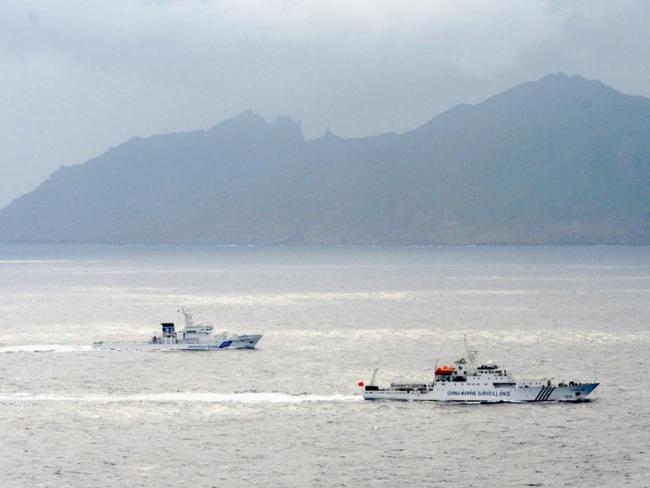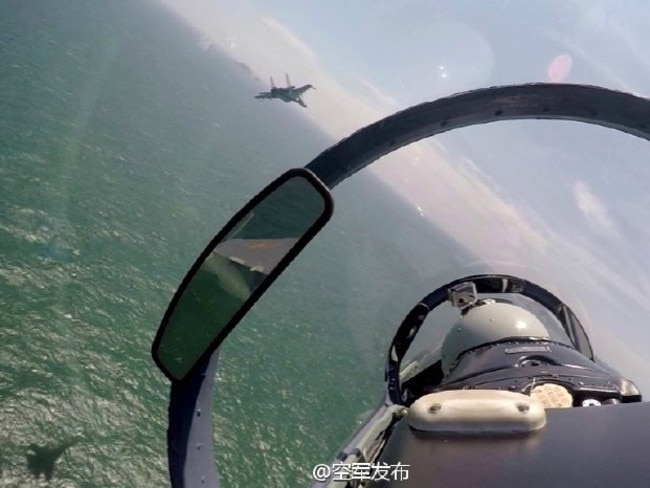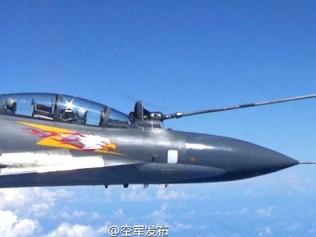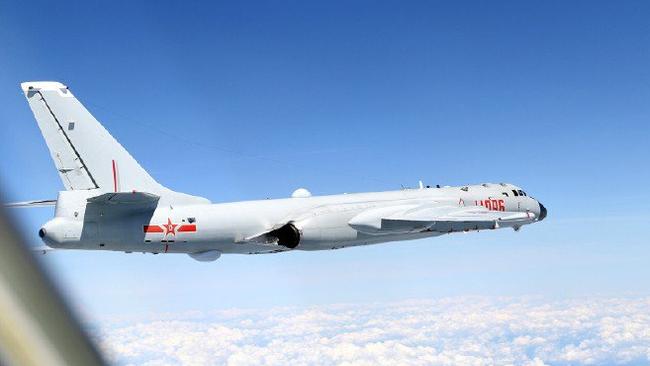Belligerent Beijing: Combat air patrols over South China Sea, escorted fishing fleet in the East China Sea
CHINA’S military posturing in the South China Sea is reaching new levels, with a promise of regular “combat air patrols”.
BEIJING has promised regular ‘combat air patrols’ over the South China Sea as a fleet of hundreds of fishing boats push into waters claimed by Japan in another escalation of tensions.
The People’s Liberation Army Navy and Air Force have been increasingly active after the international arbitration court last month ruled against Beijing’s claims to almost all of the East and South China Seas.
Government representatives reacted angrily to the verdict, dramatically escalating their war of words with the Philippines, Japan, the United States and Australia.
But Beijing’s actions have not been limited to words alone.
EXPLORE MORE: War games explore China conflict
DELVE DEEPER: ‘You will suffer more’, Beijing vows
Activities in recent days are a continuation of the military posturing being used to assert Beijing’s expansive claims of territorial ownership.
The South China Morning Post reports a retired PLA colonel, Yue Gang, as saying much of China’s naval forces were now concentrated in the East China Sea.
“We need to maintain a certain level of [air] power in the South China Sea so we can throw a punch at any time,” Yue reportedly said.

FISHING FLEET ADVANCES
Japan’s Coast Guard is reporting 14 Chinese government patrol vessels were counted yesterday in waters surrounding the disputed Senkaku/Diaoyus islands in the East China Sea northeast of Taiwan. Their numbers had been steadily increasing since the first was spotted in the area on Saturday.
The Chinese government ships, some armed, appear to be escorting a fishing fleet of 230 vessels. These have been operating provocatively within the 19km territorial boundary surrounding the islands which would normally mark an exclusive national economic zone.
China’s foreign ministry spokeswoman Hua Chunying said in a statement on Saturday that China had indisputable sovereignty over the islands and nearby waters.
Record number of 14 #China’s coast guard vessels patrol in the #SouthChinaSea since August 8: @Yomiuri_Online pic.twitter.com/4jEuRnZBri
— People's Daily,China (@PDChina) August 8, 2016
China reiterates sovereignty over Diaoyu Islands https://t.co/43f3yU0Euw
— China SCIO (@chinascio) August 8, 2016
Tokyo has summoned Beijing’s ambassador Cheng Yonghau to explain the move.
Japan’s Defence Minister Tomomi Inada said his forces would respond with “vigilance, surveillance and the gathering of information, while continuing to act with calm, in order to resolutely protect our inherent land, sea and air territory, including the Senkaku Islands”.
A Japanese government source, who asked not to be identified, told Reuters that Japan’s coastguard had stepped up its own patrols but declined to give further details.
The move comes just days after Chinese forces finished a live-fire exercise with its North Sea Fleet.

COMBAT AIR PATROLS

Chinese media has also been reporting the PLA as having establishing regular patrols by its nuclear-capable H-6K bombers, Su-30 fighter jets and supporting surveillance and tanker aircraft over the Spratly Island and Scarborough Shaol.
These waters are also claimed by the Philippines and Malaysia.
“The Air Force is organising normalised South China Sea combat patrols, practising tactics ... increasing response capabilities to all kinds of security threats and safeguarding national sovereignty, security and maritime interests,” Senior Colonel Shen Jinke of the PLA Air Force told state news agency Xinhua.
#USSHarpersFerry conducts South China Sea transit. @USNavy committed to presence in region. pic.twitter.com/VrgfHe5NVn
— AmphibForce7thFleet (@Amphib7FLT) August 6, 2016
North Sea #Fleet conducts live-fire drill (Photos: 81. cn) pic.twitter.com/0QfAOBLN2z
— Global Times (@globaltimesnews) August 8, 2016
The South China Morning Postquotes military commentator Ni Lexiong as saying the exercises demonstrate China’s ability to fight in both the East and South China Seas at the same time.
“That was also a message to Japan that China has the initiative to choose a battlefield at will,” Ni said.
Last week, Beijing declared Australia was not even a ‘paper tiger’, but was instead a ‘paper cat’. It was warning Canberra to keep out of its South China Sea affairs after Australia joined the US and Japan in issuing a statement urging Beijing to comply with the international arbitration court’s ruling.
A new decision by South Korea and the United States to deploy an advanced antimissile defence system, to guard against North Korean attacks has also riled Beijing. It fears the interceptor missiles could be used against its own military’s operations in the East China Sea.





